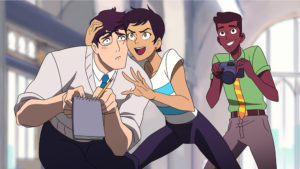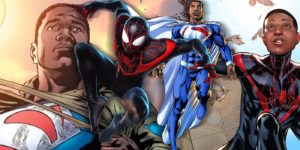(From Mav: This is a guest blog for an upcoming episode. We’re recording it soon, so give us your thoughts really quick! Take it away, John!)
From John: Like most genres, adaptation has been the key to the superhero’s popularity and longevity, spreading across multiple media to capture as wide an audience as possible. While the proliferation of such adaptations has been exponential in the twenty-first century to the point that the Guardians of the Galaxy have their own theme park ride, the practice has existed since the inception of the superhero in the late 1930s. In 1940, when issues of Superman were selling over a million copies, twenty million people were tuning into The Adventures of Superman radio show. However, while most genres perpetuate a story type (archetypal characters and settings), the superhero adaptations are unique in their focus on characters. Unlike the Western or detective fiction or romance, it is not just the superhero concept which has endured, but characters like Superman, Batman, Spider-Man, etc.
This creates a peculiar situation where the original text, the comic books, don’t really matter. The superheroes and supervillains instead lead a virtual existence within a web of intertextuality within the public consciousness. In Adapting Frankenstein(2018), Dennis R. Cutchins and Dennis R. Perry describe the heteroglossia of all the Frankenstein texts and adaptations as a Network and each person’s selective interaction with that Network, what texts they consume, as a Complex. This Complex allows for what Linda Hutcheon, in A Theory of Adaptation (2006), describes as a “palimpsestuous” experience, wherein each adaptation becomes an intertextual layer through which all previous versions of that text that have been experienced are also remembered. So, watching episodes of the new animated series My Adventures with Superman, which features an Asian-American Lois Lane and an African-American Jimmy Olsen, will be filtered through the memories of things such as episodes of Lois and Clark and Henry Cavill’s performance and Christopher Reeve’s performance and so on back to Action Comics #1. This requires the character of Superman to consist of alchemical mixture of essential elements which never change and malleable components which can change to suit the culture of the time and audience.
Given the numerous permutations of a superhero in something like Spider-Man: Across the Spider-Verse, it may be asked what the essential components that identify a superhero are. Its not just Peter Parker under the mask, but Miles Morales and dozens of others, so is it just the superpowers and iconography of the costume? In the video game Injustice, Superman becomes a violent tyrant yet is still recognized as Superman. Does the character have to stay heroic to be recognizable? Is there a point when a character like Spider-Man or Superman is changed so much they are longer recognizable?
Marshall McLuhan considered comic books to be a “cool medium,” requiring a high amount of audience participation to complete the story. But the superhero genre has permeated all media: film, television, literature, radio shows, podcasts, video games, board games, card games, role-playing games, musicals, merchandising, etc. How does moving into a “hot medium,” like film, affect superheroes? The intersection of superhero studies and adaptation studies is unique and offers the opportunity to expand our understanding of both fields.





I don’t know if I would say “unrecognizable,” and there’s certain enough “superhero-turned-supervillain” content out there that I think we would recognize any superhero as themselves in villain format, but I personally would want a redemption arc. I would want to understand that it’s a symbiote making them evil, or they’re under hypnosis, etc.
But I also worry a lot about the impact of film on superhero characters. I talk about it often with the MCU – there are so many interesting characters available in Marvel’s lexicon of characters, but (in my opinion) Hollywood is so worried about the $$ at the end of the day that they keep banking on “the Chrises” and RDJ, etc, that they aren’t willing to explore other characters. Diverse characters, that would allow for a wide range of adaptations that have the potential to be wildly popular. They don’t have to make “a fill-in-the-blank” Captain America, they could just make a movie or show about any of the other hundreds of superheroes Marvel has to offer that are already available, but they don’t want to risk it. They gotta just keep remaking Spiderman, because the people already recognize that name. Even if he’s nothing like Spiderman was to begin with.
I see you point, but I don’t think it’s quite that bad. Yes, of course they make tons of Spider-man and Batman movies. But they’ll also take chances. For instance DC is doing Blue Beetle this summer. Marvel has Guardians and Eternals. Sony did Morbius. Sure, sometimes they don’t work, but I think they’re certainly trying to expand their libraries beyond just the obvious.